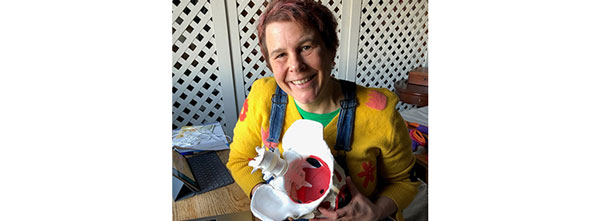, Bridge Magazine , Q & A

Rachel Andrew is a Continence and Women’s Health Physiotherapist, based in Hobart, Tasmania. Rachel is passionate about women having access to pelvic floor physiotherapy and being able to talk about intimate symptoms in a safe space.
She has shared her experience of switching to treating clients through telehealth, due to the COVID-19 pandemic. Telehealth is a way of accessing health care through remote communication technology like online video, phone call or chat.
What started your interest in physiotherapy and women’s health?
I was always interested in women’s health and did a student placement at the Royal Hospital for Women in Sydney. I was working in rehabilitation with people recovering from strokes and brain injuries and many had bladder and bowel issues.
I was also treating two younger women, one who had a pelvic fracture after a motorbike accident and one with a neurological disease. They were both worried about returning to sex and asked me about it as I was their age. I had no idea but decided that wasn’t good enough and started learning more. I then went on and studied a Master of Continence and Women’s Health at Curtin University along with other further education. Here I am, still learning and loving it!
What has it been like moving from in-person to online?
It was a steep learning curve! I decided to shut the face-to-face clinic early. I could see the impact of the disease on the health system in other countries and wanted to do my bit in flattening the curve. Usually, I see about 70 women a week and closing the clinic was a huge and emotional personal decision.
I thought I would try telehealth. After all, anything was better than nothing to support my clients. Let’s face it, we are a touching profession and physiotherapists pride themselves on their physical skills. At first it was a massive change and I really didn’t think it would work. Then I found out about all the evidence for telehealth.
I have done a complete U-turn in my own mind. A couple of new clients who I have never seen in the real world have already experienced some great results. They have found that their leakage and prolapse symptoms have improved.
Clients are reporting that they find it helpful and are still making similar comments as before, when it comes to improving their understanding of what is going on. The main difference is that clients now have to do more of the work. I will give them some problem-solving to do and that leads them to the answers for their body.
Have there been any unexpected benefits to telehealth?
I have been able to see some women soon after their deliveries to deal with problems resulting from birth injuries, rather than waiting until six weeks. This has been helpful for them in improving symptoms and reducing worry.
Telehealth has been great for people who have had previous traumatic experiences or are scared about seeing a pelvic physiotherapist. We know that there is sometimes fear if a person has experienced pain in the past. Remote appointments allow for less fear and for the patient to immediately be in the driving seat. This is allowing some people to progress their treatment faster.
The other benefit is no travel! Some women have to drive three to four hours to see me, so this is something I am definitely going to keep available on the calendar in the future. Of course, telehealth doesn’t work for everyone. For example, we can’t manage pessaries (a device fitted inside the vagina). Some people don’t have space or privacy to discuss pelvic health issues when they are at home.
What would you like to tell someone who is considering getting help for their bladder, bowel and pelvic health issue?
Fix it, don’t live with it! I see women in my clinic, but these issues can affect all people. Often bladder and bowel issues, prolapse or pelvic pain can be very well-managed or corrected quickly.
These issues are made worse by worry and not really understanding what is going on. They are common, not normal, and can have a really big impact on your life. If you have the time and the mental space, get it sorted. It is never too soon or too late. Often people say they wish they had come years earlier.
How is talking and communication with others important for health?
It is so important to break down the mystery, and sometimes shame and taboo around some health issues. Pelvic health issues are so common and yet so mysterious; we don’t know much about our own anatomy. If you can open up and share, you may be able to help someone else. I like to think that everyone I see then becomes a women’s health warrior!
This story was first published in Bridge magazine. Subscribe to Bridge online.

